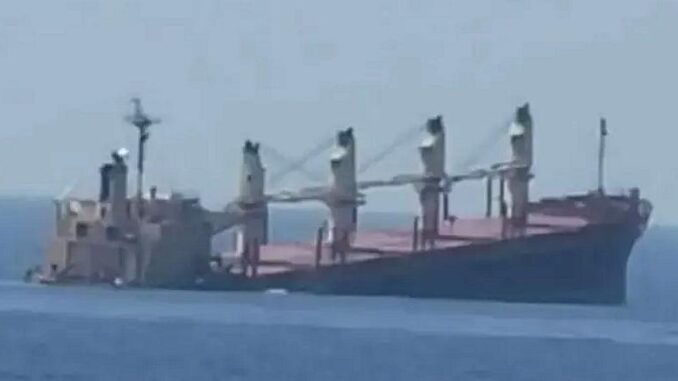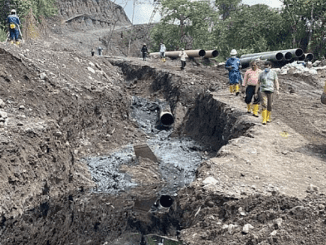
ADEN, Yemen, March 2, 2024 (ENS) – The UK-owned cargo ship Rubymar, attacked by Houthi militants in mid-February, finally sank in the Red Sea Friday night off the coast of Yemen in rough, stormy seas. The internationally recognized government of this small, war-wracked country warned Saturday that an “environmental catastrophe” could result if the ship’s cargo of fertilizer is lost into the sea.
The Rubymar is the first vessel lost to Houthi attacks since November when the Houthis began targeting commercial shipping moving past Yemen. Their attacks have interrupted international trade on the shortest shipping route between Europe and Asia and forced shipping firms to divert vessels to reroute around southern Africa instead of through the Red Sea, a much longer, more expensive route.

Ahmed Awad bin Mubarak, the new prime minister of Yemen’s government, called the sinking of the Rubymar “an unprecedented environmental disaster.”
The Yemeni government Saturday convened an emergency meeting to address the potential environmental consequences.
Greenpeace’s Middle East and North Africa office is urgently calling for action in response to confirmed reports of the sinking of the Rubymar in the Red Sea.
Believed to be carrying over 41,000 tonnes of ammonium nitrate fertilizer, as estimated by the U.S. military’s Central Command, the wreck of the Rubymar “presents an imminent danger to the delicate marine ecosystems in the area,” the international nonprofit is warning.
Program director at Greenpeace MENA, Julien Jreissati said, “Without immediate action, this situation could escalate into a major environmental crisis. As well as any further leaks of fuel oil from the engines, the sinking of the vessel could further breach the hull, allowing water to get in contact with the thousands of tonnes of fertilizer, which could then be released into the Red Sea and disrupt the balance of the marine ecosystems, triggering cascading effects throughout the food web.”
“This disruption could have far-reaching consequences, affecting various species that depend on these ecosystems and, in turn, potentially impacting the livelihoods of coastal communities,” Jreissati said.
“Immediate access to the shipwreck site is imperative for an expert response team to assess the situation and swiftly devise and implement an emergency plan,” he said.
Yemen’s Red Sea coast is characterized by shallow fringing coral reefs. Whales and dolphins are found in these water, as are sharks and many species of fish and sea birds.
Chemists say that when ammonium nitrate is mixed with sodium chloride, or seawater, no precipitate will form as sodium chloride and ammonium nitrate are both completely soluble in water.
However, fertilizer mixed with seawater causes coastal algae to proliferate. The algae take most of the oxygen in the water, causing fish to die and disrupting the food chain for humans and other creatures.
The UK-registered, Belize-flagged and Lebanese-operated cargo ship Rubymar carried thousands of tons of fertilizer and oil. The government expressed regret over the sinking, warning against a possible major environmental disaster in Yemen’s territorial waters.
On February 18, the Houthis fired two missiles at Rubymar while it was passing through the Red Sea, damaging the ship. The Houthis said they believed the ship was carrying weapons bound for Israel, and said they were in solidarity with Palestinians in Gaza who face intense Israeli attacks.
Even so, on Monday, the Yemeni government again called for international help to contain a potential massive oil spill from the sunken Rubymar. An emergency committee has been formed to deal with the potential crisis.
The United States government has named the Houthis a Specially Designated Global Terrorist entity, and U.S. and British forces since January have answered the Houthi attacks with dozens of airstrikes on Houthi targets, but have failed to stop the onslaught.
Featured image: The UK-registered, Belize-flagged and Lebanese-operated cargo ship Rubymar sinks in the Red Sea. (Photo courtesy BBC)
© 2024, Environment News Service. All rights reserved. Content may be quoted only with proper attribution and a direct link to the original article. Full reproduction is prohibited.



